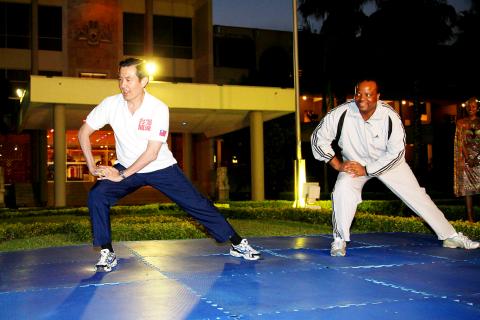President Ma Ying-jeou (馬英九) on Sunday said in Swaziland, the final stop of his 12-day trip to Africa, that his three-nation visit had helped him gain a deeper understanding of the country’s diplomatic allies.
“It’s been a worthwhile trip,” Ma said, adding that Taiwan had forged strong friendships with its diplomatic allies during the trip.
Ma also talked about his administration’s promotion of “flexible diplomacy” since he took office in 2008, saying that a diplomatic truce with China has won international recognition.

Photo: CNA
On the economic front, Taiwan should “conditionally provide assistance” to its diplomatic allies in Africa because their economies are still developing and need foreign aid, Ma said.
“We should try to make others feel we are an international asset rather than a liability” by contributing to international assistance programs in accordance with the norms set by the Organisation for Economic Co-operation and Development,” Ma said.
Taiwan has donated 300 notebook computers worth US$300,000 to the southeast African kingdom, Ambassador to Swaziland Peter Tsai (蔡明耀) announced on Sunday.
It has also donated 1.6 million euros (US$2.1 million) to Burkina Faso to help it address problems caused by the influx of 40,000 refugees from Mali and US$3 million to The Gambia to help deal with a food crisis.
After taking part in a -penalty-kick soccer shootout in The Gambia with Gambian President Yahya Jammeh on Saturday, Ma had another sports challenge with Swazi King Mswati III, Africa’s sole remaining absolute monarch, after arriving there on Sunday, in which Ma and the king both did 20 pushups and 20 sit-ups.
The president’s visit was meant to solidify diplomatic ties, deepen understanding and review joint projects in medicine, agriculture, vocational education and infrastructure, the Ministry of Foreign Affairs said.
Ma is scheduled to return to Taiwan tomorrow.

‘DENIAL DEFENSE’: The US would increase its military presence with uncrewed ships, and submarines, while boosting defense in the Indo-Pacific, a Pete Hegseth memo said The US is reorienting its military strategy to focus primarily on deterring a potential Chinese invasion of Taiwan, a memo signed by US Secretary of Defense Pete Hegseth showed. The memo also called on Taiwan to increase its defense spending. The document, known as the “Interim National Defense Strategic Guidance,” was distributed this month and detailed the national defense plans of US President Donald Trump’s administration, an article in the Washington Post said on Saturday. It outlines how the US can prepare for a potential war with China and defend itself from threats in the “near abroad,” including Greenland and the Panama

A wild live dugong was found in Taiwan for the first time in 88 years, after it was accidentally caught by a fisher’s net on Tuesday in Yilan County’s Fenniaolin (粉鳥林). This is the first sighting of the species in Taiwan since 1937, having already been considered “extinct” in the country and considered as “vulnerable” by the International Union for Conservation of Nature. A fisher surnamed Chen (陳) went to Fenniaolin to collect the fish in his netting, but instead caught a 3m long, 500kg dugong. The fisher released the animal back into the wild, not realizing it was an endangered species at

The High Prosecutors’ Office yesterday withdrew an appeal against the acquittal of a former bank manager 22 years after his death, marking Taiwan’s first instance of prosecutors rendering posthumous justice to a wrongfully convicted defendant. Chu Ching-en (諸慶恩) — formerly a manager at the Taipei branch of BNP Paribas — was in 1999 accused by Weng Mao-chung (翁茂鍾), then-president of Chia Her Industrial Co, of forging a request for a fixed deposit of US$10 million by I-Hwa Industrial Co, a subsidiary of Chia Her, which was used as collateral. Chu was ruled not guilty in the first trial, but was found guilty

DEADLOCK: As the commission is unable to forum a quorum to review license renewal applications, the channel operators are not at fault and can air past their license date The National Communications Commission (NCC) yesterday said that the Public Television Service (PTS) and 36 other television and radio broadcasters could continue airing, despite the commission’s inability to meet a quorum to review their license renewal applications. The licenses of PTS and the other channels are set to expire between this month and June. The National Communications Commission Organization Act (國家通訊傳播委員會組織法) stipulates that the commission must meet the mandated quorum of four to hold a valid meeting. The seven-member commission currently has only three commissioners. “We have informed the channel operators of the progress we have made in reviewing their license renewal applications, and